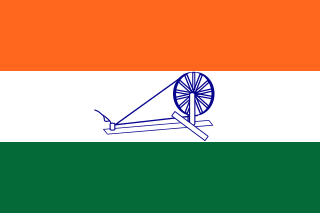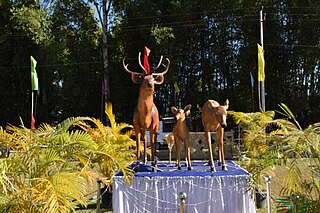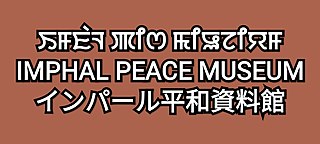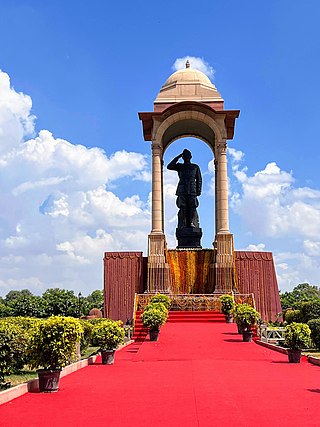
The Indian National Army was a collaborationist armed unit of Indian collaborators that fought under the command of the Japanese Empire. It was founded by Mohan Singh in September 1942 in Southeast Asia during World War II.

Subhas Chandra Bose was an Indian nationalist whose defiance of British authority in India made him a hero among many Indians, but his wartime alliances with Nazi Germany and Imperial Japan left a legacy vexed by authoritarianism, anti-Semitism, and military failure. The honorific 'Netaji' was first applied to Bose in Germany in early 1942—by the Indian soldiers of the Indische Legion and by the German and Indian officials in the Special Bureau for India in Berlin. It is now used throughout India.

The Provisional Government of Free India or, more simply, Azad Hind, was a short-lived Japanese-controlled provisional government in India. It was established in Japanese occupied Singapore during World War II in October 1943 and has been considered a puppet state of the Empire of Japan.

Moirang is a town in the Indian state of Manipur, best known for the tentatively listed UNESCO World Heritage Sites of the Keibul Lamjao Conservation Area (KLCA), covering Keibul Lamjao National Park (KLNP), the world's only floating national park, the buffer of Loktak Lake and Pumlen Pat. It is best known for the being the place of origin of the ancient epic legend of Khamba and Thoibi, one of the seven epic cycles of incarnations of Meitei mythology and folklore. Nationwide, it is also famous for the INA War Museum in the INA Martyrs' Memorial Complex, where Colonel Shaukat Malik of the Indian National Army hoisted the Tricolour for the first time on Indian soil on 14 April 1944. It is situated approximately 45 km (28 mi) south of the state capital Imphal. It has an area of 269 km2 (104 sq mi) with a population of 62,187 in 67 villages. There are 12 Panchayats in this block.

Netaji Subhas Chandra Bose: The Forgotten Hero is a 2004 Indian epic biographical war film, written and directed by Shyam Benegal. The film starred an ensemble cast of Sachin Khedekar, Kulbhushan Kharbanda, Rajit Kapur, Arif Zakaria, and Divya Dutta, among others. The film depicts the life of the Indian Independence leader Subhas Chandra Bose in Nazi Germany: 1941–1943, and in Japanese-occupied Asia 1943–1945, and the events leading to the formation of Azad Hind Fauj.

The Former Indian National Army Monument is a historical site and a demolished war memorial at the Esplanade Park located at Connaught Drive within the downtown of Singapore.

The Tokyo Cadets or the Tokyo Boys, was the name given to the group of forty five youth recruits of the Indian National Army who were sent to the Imperial Japanese Army Academy or Imperial Japanese Army Air Force Academy to train as fighter pilots in 1944 by Subhas Chandra Bose. The cadets were captured as prisoners of war after Japan surrendered, but were released in 1946 after the end of the INA trials. The cadets became officers in the Indian forces, Burma Navy, Pakistan forces, and private pilots. Some of them became general officers.
Mairembam Koireng Singh (1915–1994), also known as Moirang Koireng, was an Indian politician and activist. Coming from the Indian National Congress, Mairembam Koireng Singh became the first Chief Minister of Manipur and he governed the state in three terms between 1963 and 1969.

Sangai Festival is an annual cultural festival organised by Manipur Tourism Department every year from 21 to 30 November. Even though many editions of this Festival has been celebrated over the past few years with the name of Tourism Festival, since 2010 this has been renamed as the Sangai Festival to stage the uniqueness of the shy and gentle brow-antlered deer popularly known as the Sangai, a regional name given to this rare species of deer. It is the state animal of Manipur. As this festival is being celebrated to promote Manipur as a world class tourism destination, it showcases the states contributions to art and culture, handloom, handicrafts, fine arts, indigenous sports, cuisine, music and adventure sports, as well as the natural environment. it is celebrated in different parts mainly in the valley areas of imphal. Many tourists come from all over the world and represent their craft making. Many people have also started to talk about the way Sangai festival is celebrated. They say that it should be celebrated only in one place with a proper arrangement and with big budget so that this festival grows more bigger and unique and spread all over the world.
The Indian National Army (INA) and its leader Subhash Chandra Bose are popular and emotive topics within India. From the time it came into public perception in India around the time of the Red Fort Trials, it found its way into the works of military historians around the world. It has been the subject of a number of projects, of academic, historical and of popular nature. Some of these are critical of the army, some — especially of the ex-INA men — are biographical or autobiographical, while still others historical and political works, that tell the story of the INA. A large number of these provide analyses of Subhas Chandra Bose and his work with the INA.

The INA Martyrs' Memorial complex is a war memorial at Moirang, 45 km south of Imphal, in Manipur state of India, dedicated to the soldiers of the Indian National Army. The main feature of the complex is a reconstruction of the INA's memorial to its fallen soldiers as it stood in Singapore, before its demolition at the hands of British Indian Army sappers in 1945. The complex also contains a museum dedicated to the INA along with a library and an auditorium and a statue of Subhas Chandra Bose. Work on the cenotaph itself began in October 1968 and was completed in September 1969, when it was unveiled by Indira Gandhi. Work on expanding the monument complex to present-day size was completed in 2005, when it was unveiled. The total cost in building the memorial was Rs 6.23 crores. A stone monument has also been erected at the historic Moirang Kangla, where Colonel S. A. Malik leading an INA unit raised the flag of Azad Hind in April 1944. The Imphal state government has administered the site since 1985. Close to the complex is the peace memorial at Lotpaching, raised by the Japanese government. 205 km north of Moirang & 55 km west of Kohima is another monument at Chesezu related to INA, with a statue of Subhash Chandra Bose marking the last camp where Neta ji Subhash Chandra Bose camped for 2 months.

The Imphal Peace Museum (IPM) (Meitei: Imphal Aying-Achik Pukei Lankei Shanglen, Japanese: インパール平和資料館, romanized: Inpāru heiwa shiryōkan) is a World War II museum at the foothills of the Red Hills (Maibam Lotpa Ching) in Manipur, India. It is a living memory of the Battle of Imphal (Anglo-Japanese war) and other World War II battles (March–July 1944) fought in Manipur. It is supported by the non profit grant making Nippon Foundation (TNF), collaborating with the 2nd World War Imphal Campaign Foundation, Manipur Tourism Forum and the Government of Manipur. Notably, in a poll conducted by the British National Army Museum, the Battle of Imphal and Kohima was bestowed as Britain's Greatest Battle.

The Manipur State Museum is an institution displaying a collection of artistic, cultural, historical and scientific artefacts and relics in Imphal, Manipur, India. It has galleries housing materials of natural history, ethnology and archeology.

The Loktak Folklore Museum or the Thanga Folklore Museum is a folk museum in Thanga Island in the Loktak lake of Manipur, India. It cares for and displays a collection of artistic, cultural and historical artefacts associated with the Loktak lake. The museum preserves the folk customs and beliefs, folk medicines, folk literature associated with the Loktak lake.

Thangching or Thangjing is a primordial deity in Sanamahism, the indigenous religion of Manipur. He is the ruling deity of the Moirang dynasty. He rules supreme on the banks of the landlocked sea, Loktak lake. He is one of the four cardinal Umang Lais. The guardianship of the south western direction is alluded to Thangjing and the other directions to Koubru, Marjing and Wangbren.

Statue of Subhas Chandra Bose, also known as the Netaji's Statue, is a monolithic statue made of black granite, dedicated to Netaji Subhas Chandra Bose, Indian freedom fighter and Commander-in-Chief of Indian National Army. The statue 28 feet (8.5 m) in total height, including a 8 feet (2.4 m) in total width. It is placed under the canopy behind India Gate in Delhi. The statue was sculpted by Mysuru-based sculptor Arun Yogiraj, whose other prominent works include the Statue of Adi Shankaracharya in Kedarnath. Prominent attendees at the dedication ceremony in 2022 included Prime Minister Narendra Modi, members of his cabinet, MP Hardeep Singh Puri, G. Kishan Reddy and Arjun Ram Meghwal.

Kabok or Kapok is a Meitei Manipuri ethnic food item, generally made up of puffed rice, roasted rice and molasses. It is available in many flavours, including honey flavor, sugarcane flavor and many others. It is a very popular snack in the Indian state of Manipur, especially among the Manipuri ethnicity. Tronglaobi village is the largest Kabok producing village in Manipur

Women have significant roles in different elements of Meitei culture, including Meitei dances, Meitei festivals, Meitei folklore, Meitei folktales, Meitei literature, Meitei mythology, Meitei religion, etc.
Yairipok Thambalnu, originally known as Sanoujam Chanu Thambalnu or simply as Thambalnu, was a Meitei lady native to Yairipok region of Kangleipak. She was a victim of intrigues and was forced to meet a tragic death in drowning in a flooding river.

Japanese people and Meitei people have a long history of sharing and interacting with each other's art and cultural heritages, including but not limited to cinema, music, mythology, language, literature and theatre.

















